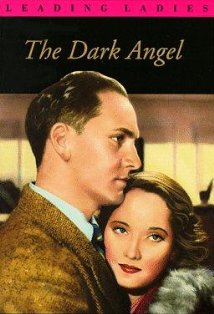
THE DARK ANGEL
US, 1935, 106 minutes. Black and white.
Fredric March, Merle Oberon, Herbert Marshall, Frieda Inescort.
Directed by Sidney Franklin.
The Dark Angel was a popular melodrama of 1935. It resembles in its plot, the 1933 film, Today We Live, with Joan Crawford, Gary Cooper and Robert Young (from a story by William Faulkner). This film was based on a play by Guy Bolton (writer of Anything Goes and source for many MGM musicals of the 1940s). It was adapted for the screen by playwright Lillian Hellman.
The film is a star vehicle for Fredric March who had won an Oscar for Dr Jekyll and Mr Hyde three years earlier. Herbert Marshall was a reliable standby for this kind of second lead role for several decades. The film is an early star vehicle for Merle Oberon who had appeared in The Private Lives of Henry VIII and The Scarlet Pimpernel. She received an Oscar nomination. She was to make such classics as Wuthering Heights.
Direction is by Sidney Franklin who had made The Barretts of Wimpole Street – and was to make the remake in 1957.
The setting is England, the background is World War One. The film focuses on two men suitors to Merle Oberon. In their war experience, there are misunderstandings, the report of the death of one of the men – and his later reappearance, blind, and a reconciliation similar to that which would come at the end of Random Harvest.
1. The popularity of this kind of melodrama in the 1930s? in retrospect?
2. The background of World War One? The adaptation of the play? Opening out the play? Black and white photography, England, the war? The musical score?
3. The title – and its relation to the characters? The tone?
4. The background of the children, their friendships, Alan, Kitty and Gerald? The patterns of their childhood and the transition to adulthood? The bonds between them?
5. World War One, the battles? The effect of involvement in war? The return from the war? The news of Alan’s death? Marriage? Gerald’s role?
6. The war sequences, the picturing of action? The mission? Gerald and his role? Alan and his action? Gerald and the misunderstanding? His sending Alan on the mission? The repercussions?
7. Alan, his being injured, hiding, blind? The interactions with the doctor? His decision to be a recluse? The children, his writing? His work with his secretary? The meeting with Kitty, the pretence? The reconciliation?
8. The portrait of Kitty, her charm, her relationship with Alan, with Gerald? Love? The night before the battle? Her premonitions? Believing Gerald, thinking Alan dead?
9. Gerald, a good man, friendship, love? His misinterpreting Alan’s behaviour? Sending him on the mission? The news of his death? Blaming himself? The truth?
10. The portrait of the doctor, his work with Alan? Alan’s secretary, her work and devotion?
11. The emotional impact of the film? As romance? Twenty years after World War One?